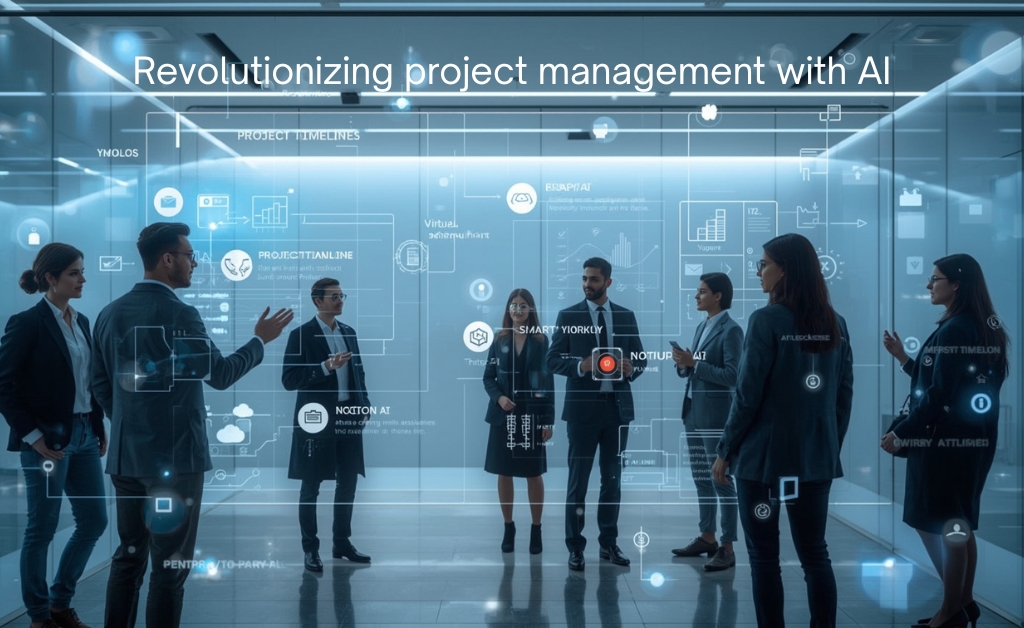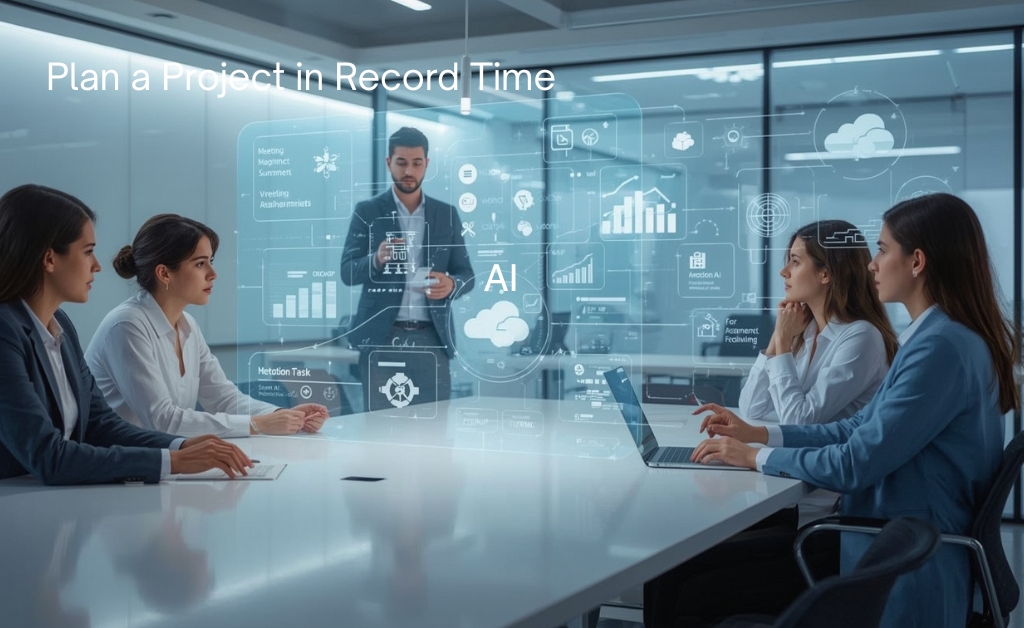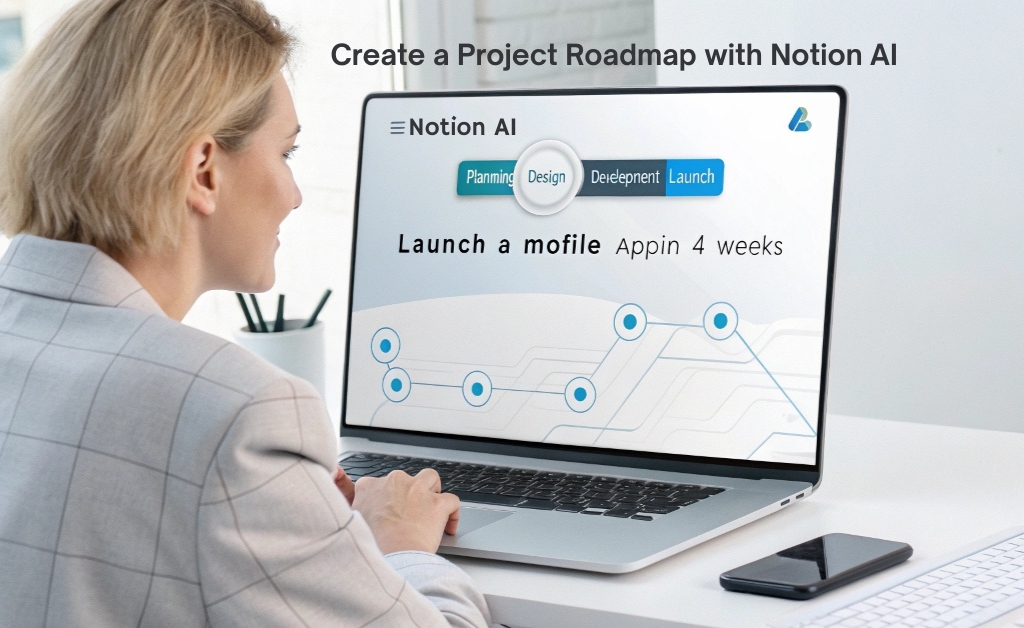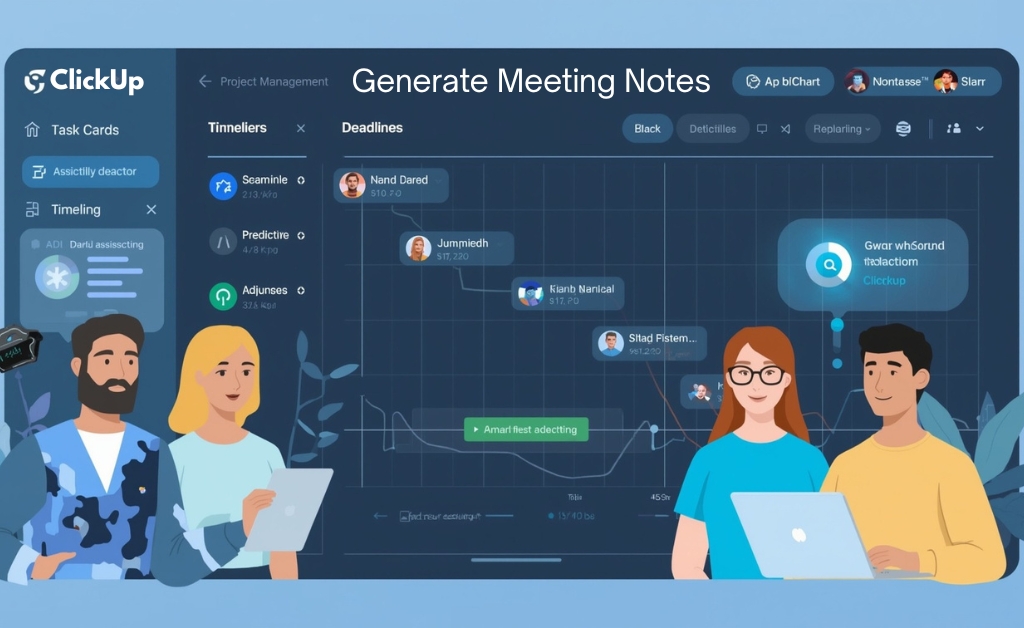Did you know that over 70% of projects fail to meet their goals due to poor planning and communication? Artificial intelligence (AI) changing the game by streamlining project management from start to finish in this article, discover how AI-powered tools revolutionize planning, collaboration and progress tracking – helping teams deliver faster and smarter ready to transform your workflow ? lets dive into the future of project management together.
Plan a project in record time with AI
Imagine starting your project with a complete roadmap ready in minutes – not hours that’s no longer science fiction, thanks to artificial intelligence- project planning has evolved into a streamlined, intelligent process that adapts to your workflow and eliminates guesswork let’s break down how AI tools can help you plan smarter – faster and with fewer errors.
Smart roadmap creation with AI
Gone are the days when you had to drag boxes around a Gantt chart or build task list manually in spreadsheets tools like Notion AI and Taskade are redefining what it means to plan these platforms can automatically generate entire project roadmaps from a simple prompt.
Key Insight: With just a few lines of description, AI can break down deliverables into tasks set dependencies and map out your timeline
Take Notion AI for example you can ask it to create a product launch plan and within seconds, it will outline phases like research – development – testing, and marketing – with due dates and checklists included this kind of automation is a game-changer, especially for solopreneurs and startup teams with limited bandwidth.
Dynamic task generation based on goals
AI doesn’t just spit out generic to-do lists instead, it learns from your teams past performance available resources and goal priorities it creates a living, evolving plan that updates as new information arises.
- Context-aware planning: AI understands whether you’re building an app or launching a campaign and tailors the structure accordingly
- Template learning: Tools like Jasper Workflows and ClickUp AI adapt over time, suggesting better templates and naming conventions
- Milestone prediction: Based on your industry and project type, the AI suggests realistic deadlines
Workload estimation and smart resourcing
Ever underestimated how long a task would take? or overloaded a team member without realizing it? AI fixes this by analyzing historical data, team capacity and task complexity.
Expert opinion: A 2023 “Harvard Business Review” study found that teams using AI-driven workload planning improved their delivery accuracy by 38% and reduced burnout by 25%
With ClickUp AI for instance, you can input your team’s working hours – skills – and time off and it will intelligently distribute work -reducing overtime while ensuring deadlines are met
Real-time scenario modeling
Let’s say you suddenly lose a key resource or need to deliver the project a week earlier traditional tools make it hard to re-plan everything quickly but AI tools like Smartsheet AI or Asana’s predictive engine allow you to model “what-if” scenarios instantly.
| Scenario | AI response | Manual effort saved |
|---|---|---|
| Task delay detected | AI shifts dependent tasks and notifies stakeholders | 2+ hours of replanning |
| Scope increases mid-project | AI reassigns resources and suggests deadline options | 1 full planning meeting |
| Team member unavailable | AI redistributes tasks based on skills and bandwidth | 30–60 minutes of manual review |
Integrated goal tracking
AI isn’t just for setup – it helps track alignment throughout the entire project tools like Reclaim.ai integrate personal calendars, project timelines and task systems to ensure daily efforts contribute directly to strategic objectives.
Major Insight: AI can correlate small tasks with big-picture goals -reminding teams why their work matters and when to pivot
That kind of clarity isn’t just helpful – it’s motivating when a developer sees that their sprint task feeds directly int a product launch deadline, they stay focused When marketing sees how their copy aligns with KPI, it improves quality AI links the micro to the macro and that’s powerful.
Benefits summary: Why AI is a game-changer for planning
- Saves hours of manual task breakdowns
- Reduces planning errors and missed steps
- Optimizes task delegation and resource usage
- Offers real-time updates and adaptive workflows
- Improves motivation through goal alignment
In short, AI transforms the “planning” phase from a static task into a responsive, intelligent system it learns – adapts – and improves so your next project is always better than the last the next time you sit down to launch a campaign or build a product, ask yourself: do you want to spend the day planning – or let AI do it in 5 minutes so you can focus on execution?
Collaborate efficiently with AI-powered team management tools
Planning is just the beginning once the roadmap is in place, execution depends on something even more unpredictable: people communication breakdowns unclear feedback, endles meetings… sound familiar? here’s where AI steps in to become your team’s best collaborator.
AI-driven communication tools
Whether your team is remote, hybrid or in-office real-time communication is essential and often chaotic AI-enhanced platforms like Krisp AI – Slack GPT – Zoom AI Companion help you cut through the noise.
- Live Transcription: Real-time text capture of all discussions (great for inclusivity and post-meeting clarity)
- Noise Cancellation: Krisp’s AI removes distractions like barking dogs or keyboard tapping
- Automatic Summarization: No need to take notes AI captures key takeaways and decisions
Key Point: You no longer have to “attend” every meeting to stay aligned AI can summarize it for you while you focus on deep work
Automated meeting notes and action items
Ever left a meeting and asked “wait what was I supposed to do?” that’s history with tools like Fireflies AI or Otter.ai these apps not only record and transcribe meetings -they identify action items, assign owners and integrate directly into your task manager.
It’s like having a virtual assistant in every call, keeping everyone accountable without adding extra admin work
Smart feedback loops
Feedback is the lifeblood of iteration -but gathering, understanding and implementing it is hard AI helps here by analyzing sentiment, suggesting improvement areas and even flagging issues before they escalate.
- Sentiment Analysis: Tools like grammarly business AI assess tone across written feedback
- Behavior Tracking: AI detects if someon is disengaged (e.g. low Slack activity, missed tasks)
- Real-Time Suggestions: Platforms suggest more empathetic or persuasive language on the fly
Stanford research: Teams using AI-enhanced feedback tools saw 31% faster resolution of interpersonal conflicts and a 20% rise in positive peer reviews
Cross-platform synchronization
Modern teams use dozens of tools: Slack – Trello – Asana – Zoom – Gmail… the list goes on, AI-powered platforms act as “unifiers” integrating all sources and surfacing only what’s relevant to each role.
This drastically reduces context-switching, which -according to a 2022 Stanford study costs teams up to 40% of their productive time
Summary: The collaboration superpower you didn’t know you needed
- No more messy meeting notes -AI captures them for you
- Less miscommunication -sentiment-aware messaging and summaries
- Higher accountability -tasks and owners tracked automatically
- Better alignment -everyone sees only what matters to them
With AI, your team can spend less time coordinating and more time creating it doesn’t just improve collaboration -it transforms it from friction into flow
Track progress and anticipate risks with AI
Planning and collaboration get your project off the grond -but tracking performance and mitigating risks is what ensures a smooth landing. that’s where AI relly earns its stripes it doesn’t just passively collect data- it watches patterns, sounds alerts, and even suggests solutions before problems arise let’s explore how AI can turn your data into your best project advisor.
Predictive analytics for proactive project management
Traditional project tracking is reactive you notice a delay after it happens. you find out the budget is tight when it’s too late but AI shifts the paradigm to predictive project management using historical data – real-time inputs – and contextual analysis, it identifies red flags before they happen.
Expert Insight: According to a “Harvard Business School study” companies using AI-based project tracking tools reported 45% fewer cost overruns and 32% fewer missed deadlines
Platforms like Monday.com AI and Forecast continuously scan your project for risk signals:
- Missed task dependencies
- Declining team velocity
- Overlapping deadlines and resource overloads
- Scope creep and unapproved changes
Instead of reacting to problems, you’ll get suggestions like: “Reassign Task B to Sarah to avoid a 3-day delay in Sprint 2” that’s real-time, real-value foresight
Real-time KPI monitoring and smart dashboards
Project dashboards have always existed but AI elevates them to a whole new level instead of static charts, you get live-updating goal-oriented visual with predictiv commentary tools like Zoho Analytics, ClickUp AI Reports and Wrike Insights do this exceptionally well.
Want to know if you’re on track to hit Q3 deliverables? AI can tell you want to find which department is dragging the most in terms of output? AI will surface it with context and trend analysis
| Metric | AI-enhanced insight | Traditional reporting |
|---|---|---|
| Team velocity | predicts when output will drop based on fatigue trends | displays average past speed |
| Budget tracking | forecasts overspend based on scope evolution | shows current spend vs total |
| Risk factors | analyzes time logs and flags potential bottlenecks | only lists past blockers |
Key Point: AI doesn’t just visualize your KPIs – it tells a story, identifies root causes and even recommend solutions
AI-based alerts and automated reporting
Let’s be honest: no one likes compiling reports with AI, you don’t have to. whether it’s weekly status updates or client presentations, tools like Zoho Projects AI and Project Insight can generate comprehensive professional-quality reports in seconds.
- Natural Language Summaries: Reports written in human-like language, not just raw data
- Real-Time Alerts: Slack or email pings when KPIs drop below thresholds
- Audience-Specific Views: Clients get high-level summaries, devs get technical logs
AI eliminates the “reporting gap” between project managers and stakeholders everyone stays informed – without anyone wasting hours compiling data
AI-driven risk maps and mitigation planning
Identifying risks is one thing but creating action plans to resolve them? that’s where AI shines tools like Smartsheet AI and Proggio generate dynamic risk maps that update in real-time and even suggest solutions based on similar past cases.
Major Insight: AI-powered mitigation planning is like having a strategist on standby analyzing your situation and offering optimized paths forward
Example: If a developer is out sick, the AI can recommend task swaps, notify relevant stakeholders and adjust dependent timelines – all within seconds
Cross-project pattern recognition
Over time AI begins to recognize broader trends across multiple projects:
- Which team members consistently meet (or miss) deadlines?
- Which project types tend to run over budget?
- What tools or frameworks yield the highest productivity?
Armed with this insight, project managers can not only correct current issues – but build better processes moving forward
Use Case: AI in enterprise risk management
Let’s look at a real-world scenario a mid-sized SaaS company implemented Monday.com AI across its product development team. within three months, the AI flagged an issue with repeated backend delays after reviewing the data, they realized QA was constantly waiting on unfinished documentation.
The AI recommended automating the docmentation handoff through integrated checklists the result? a 27% faster release cycle and a 15% drop in customer-reported bugs
Benefits summary: Why AI redefines project tracking
- Predict delays before they happenSave time with automated, readable reports
- Get actionable insights, not just numbers
- Build risk maps and response plans in real time
- Learn from historical trends across all your projects
With AI you’re not just watching a project you’re managing it like a chess master, seeing moves five steps ahead whether you’re running a startup or leading enterprise programs, AI-powered tracking gives you clarity – control – and confidence in every phase.
Real-world use cases: AI in action across teams
We’ve seen what AI can do in theory nowlet’s look at how different teams are using it in practice here are some real-world examples across industries and project types.
1. Marketing teams: campaign planning with Jasper and Notion AI
Marketing teams are using AI to launch and monitor complex campaigns Jasper AI helps draft campaign briefs, while Notion AI organizes timelines and assigns tasks, tems can track conversion metrics and tweak messaging in real time with AI-generated insights.
2. Software development: ClickUp AI + GitHub Copilot
Product teams automate sprint planning with ClickUp AI – predict bottlenecks and integrate GitHub Copilot to generate or review code reports are automatically compiled for standups saving dev leads 4–6 hours weekly.
3. Creative agencies: Fireflies + Slack AI
Agencies often juggle multiple clients and revisions fireflies records and summarizes client meetings, Slack AI ensures clear communication and Krisp keeps remote calls clean and focused result? fewer revisions, happier clients.
4. Construction & engineering: Monday.com + Zoho Analytics
Large-scale operations use predictive scheduling, material usage forecasts and real-time risk dashboards to avoid costly delays AI also predicts weather disruptions and adjusts timelines accordingly.
5. Education & non-profits: Airtable AI for grant management
Non-profits and universities use AI to track grant deliverables, automatically generate reports for stakeholders and optimize timelines for research phases – freeing up time for impact, not admin.
AI is no longer a futuristic concept but a practical powerhouse transforming project management from rapid planning and seamless collaborationto intelligent progress tracking and risk anticipation, AI tools empower teams to work smarter and deliver better results want to stay ahead in today’s competitive landscape? Embrace AI-driven project management, share your experiences below and explore more insights to unlock your teams full potential.



